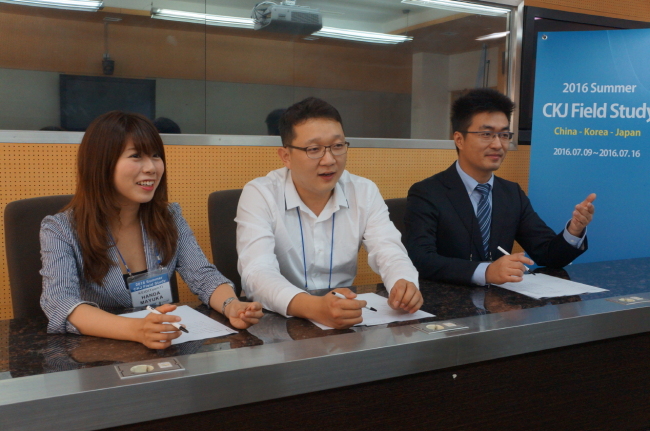Linking with overseas institutions to allow students to cultivate a global outlook and network with business leaders is a growing trend at universities here.
KAIST College of Business runs the China-Korea-Japan Field Study Program involving three institutes: China’s Tsinghua University, Korea’s KAIST and Japan’s Keio University.
This year, it invited some 40 Master of Business Administration students from the three universities to Korea from July 8-16 for them to conduct joint research on Korea’s small enterprises and exchange ideas from a pan-Asian perspective.
After visiting six enterprises here, three of the students sat with The Korea Herald for an interview on KAIST campus in northern Seoul to share their experiences and thoughts on Korea’s business environment.
“I wanted to learn about Korean and Chinese companies’ strengths (by interacting with Korean and Chinese students),” said Handa Mayuka, a Japanese student doing an MBA course at Keio University.
“Japanese (tend to) focus on details and academic solutions, while (the) Chinese are more interested in practical solutions. Koreans are balanced by pursuing both.”
KAIST College of Business runs the China-Korea-Japan Field Study Program involving three institutes: China’s Tsinghua University, Korea’s KAIST and Japan’s Keio University.
This year, it invited some 40 Master of Business Administration students from the three universities to Korea from July 8-16 for them to conduct joint research on Korea’s small enterprises and exchange ideas from a pan-Asian perspective.
After visiting six enterprises here, three of the students sat with The Korea Herald for an interview on KAIST campus in northern Seoul to share their experiences and thoughts on Korea’s business environment.
“I wanted to learn about Korean and Chinese companies’ strengths (by interacting with Korean and Chinese students),” said Handa Mayuka, a Japanese student doing an MBA course at Keio University.
“Japanese (tend to) focus on details and academic solutions, while (the) Chinese are more interested in practical solutions. Koreans are balanced by pursuing both.”

Pan Lei, a Chinese private banker pursuing an MBA at Tsinghua University, noted Korean companies’ globalization.
“Chinese companies are big in size and mostly cater to customers in China because the market is big enough for them to grow,” Pan said. “But for Korean companies, the Korean market is not big enough, so I think they are much more globalized and tend to focus on business-to-business rather than business-to-customer marketing.”
“We are different, but I think all the three countries share a similar work culture,” he said. “We are quick in setting a goal, making a decision and getting a task done as a team with one voice.”
Huang Dean-yuan, a Taiwanese-Korean student doing a MBA course at KAIST, said he was impressed by Korea’s small companies aggressively expanding their sales channels.
“I also learned that Korea’s small companies are flexible and offer work-and-life balance for their employees,” he added.
The students offered ideas on how Korean companies can thrive further.
“For Korean small companies not to be too reliant on large conglomerates, they should build their competitiveness and flexible work culture to attract competent laborers,” Handa said.
Pan added, “It is important to achieve economies of scale to cut costs and make themselves powerful enough to compete on the world stage.”
KAIST College of Business, which opened in 1995, is a Seoul-based graduate school affiliated with the Korea Advanced Institute of Science and Technology. The school has been ranked first in Asia five consecutive years based on the Financial Times rankings and provides part-time and full-time MBA programs in finance, IT, environment, corporate social responsibility and media.
By Ock Hyun-ju (laeticia.ock@heraldcorp.com)
“Chinese companies are big in size and mostly cater to customers in China because the market is big enough for them to grow,” Pan said. “But for Korean companies, the Korean market is not big enough, so I think they are much more globalized and tend to focus on business-to-business rather than business-to-customer marketing.”
“We are different, but I think all the three countries share a similar work culture,” he said. “We are quick in setting a goal, making a decision and getting a task done as a team with one voice.”
Huang Dean-yuan, a Taiwanese-Korean student doing a MBA course at KAIST, said he was impressed by Korea’s small companies aggressively expanding their sales channels.
“I also learned that Korea’s small companies are flexible and offer work-and-life balance for their employees,” he added.
The students offered ideas on how Korean companies can thrive further.
“For Korean small companies not to be too reliant on large conglomerates, they should build their competitiveness and flexible work culture to attract competent laborers,” Handa said.
Pan added, “It is important to achieve economies of scale to cut costs and make themselves powerful enough to compete on the world stage.”
KAIST College of Business, which opened in 1995, is a Seoul-based graduate school affiliated with the Korea Advanced Institute of Science and Technology. The school has been ranked first in Asia five consecutive years based on the Financial Times rankings and provides part-time and full-time MBA programs in finance, IT, environment, corporate social responsibility and media.
By Ock Hyun-ju (laeticia.ock@heraldcorp.com)
-
Articles by Ock Hyun-ju







![[Graphic News] More Koreans say they plan long-distance trips this year](http://res.heraldm.com/phpwas/restmb_idxmake.php?idx=644&simg=/content/image/2024/04/17/20240417050828_0.gif&u=)
![[KH Explains] Hyundai's full hybrid edge to pay off amid slow transition to pure EVs](http://res.heraldm.com/phpwas/restmb_idxmake.php?idx=644&simg=/content/image/2024/04/18/20240418050645_0.jpg&u=20240419100350)






![[From the Scene] Monks, Buddhists hail return of remains of Buddhas](http://res.heraldm.com/phpwas/restmb_idxmake.php?idx=652&simg=/content/image/2024/04/19/20240419050617_0.jpg&u=20240419175937)

![[KH Explains] Hyundai's full hybrid edge to pay off amid slow transition to pure EVs](http://res.heraldm.com/phpwas/restmb_idxmake.php?idx=652&simg=/content/image/2024/04/18/20240418050645_0.jpg&u=20240419100350)

![[Today’s K-pop] Illit drops debut single remix](http://res.heraldm.com/phpwas/restmb_idxmake.php?idx=642&simg=/content/image/2024/04/19/20240419050612_0.jpg&u=)